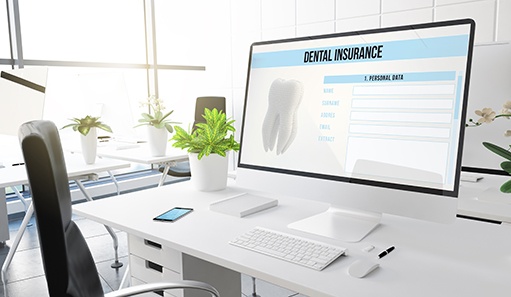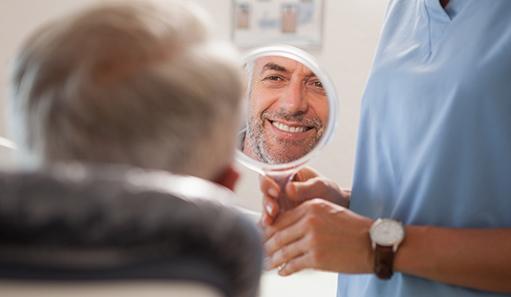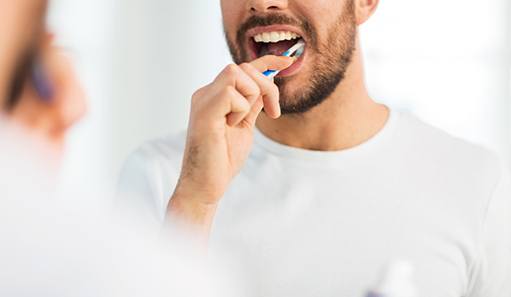Emergency Dentist – Oshkosh, WI
Getting You Out of Dental Discomfort

No one likes dealing with a dental emergency. Whether it’s a toothache that won’t go away, a chipped tooth that makes chewing food difficult, or a completely knocked-out tooth that’s causing you significant discomfort, Dr. Heil is prepared to help however he can. When a dental emergency occurs, don’t assume it will get better on its own. Instead, call our dental office, and we’ll get you seen as soon as we can for emergency dentistry in Oshkosh, WI.
Why Choose Oshkosh Complete Dentistry for Emergency Dentistry?
- Calming Sedation Options for Easier Care
- Modern Technology in a Welcoming Dental Office
- Dentist Committed to Fast Pain Relief
How We Treat Dental Emergencies

In order to resolve your dental emergency and relieve your oral pain, our team will take the following steps:
- Schedule a Same-Day Appointment: Dental emergencies tend to grow worse if they’re ignored for too long, so we’ll make arrangements to see you on the same day that you call us whenever possible. We may also give you tips for managing the problem at home until it’s time for your appointment.
- Perform an Emergency Examination: During your emergency visit, we’ll take X-rays and thoroughly examine your mouth. We’ll narrow down what’s really causing the problem and determine the full extent of the damage.
- Review Findings: Our team will share the results of our examination, then create a treatment plan based on your specific needs and feedback. We’ll make sure that you understand the costs and timelines associated with any proposed treatments.
- Give Your Smile the Care It Needs: The agreed-upon treatment plan will be carried out in order to restore your oral health as quickly as possible. From basic restorative solutions such as fillings to more advanced procedures such as root canal treatments, we’re ready to provide whatever kind of care your smile needs.
The Most Common Dental Emergencies
Whether your dental emergency is the result of an accident or poor oral hygiene, you should make a point of seeking care from a dental professional as soon as possible. Below are some examples of particularly common dental emergencies that our team is ready to help you with.
Understanding the Cost of Emergency Dentistry

Dental emergencies can be difficult to provide a specific price for without a detailed exam. That said, we always do our best to keep your treatment fees fair and will work with you to create a plan that’s within your financial means. So, don’t put off scheduling the care you need, especially if you’re in pain.
Why Every Dental Emergency is Different

Not only do patients visit us with all different kinds of dental injuries, but even the ones that visit us for the same reason may need two completely different treatments. For example, while one patient struggling with a toothache might need a dental filling, the next might need a root canal and a crown, which is more expensive. That’s why we can’t provide an estimate of the cost online! We need to complete a comprehensive oral exam and determine the best way to restore your smile first.
Does Dental Insurance Cover Dental Emergencies?

Good news: many dental insurance providers cover 100% of the cost of preventive care and between 50% and 80% of the cost of essential restorative care. Plus, some plans include additional benefits, like a free emergency exam each year. That’s why it’s so important to take the time to familiarize yourself with your benefits! Of course, if you need any help or you’re having a hard time understanding your coverage, you’re always welcome to ask us for assistance as well. We’re happy to do our part to make understanding and utilizing your benefits a breeze!
Other Options for Making Dental Emergencies Affordable

If you don’t have dental insurance, don’t let that stop you from scheduling an appointment with our emergency dentist in Oshkosh. After all, we welcome another financial solution: flexible financing! With CareCredit, a trusted third-party financier, you can space out the cost of your care into monthly installments instead of paying for it in one lump sum.
How Taking Care of Your Smile Can Save You Money

No matter what your dental emergency is, we don’t recommend taking the “wait and see” approach since this will allow the root of the problem to worsen. Instead, call us when you first notice that something is wrong, whether it’s lingering sensitivity or a sharp, stabbing pain when you bite down. That way, we can determine what the culprit is as well as the best way to address it.
Important reminder: Many common dental problems, including tooth decay, are largely preventable with the right best practices in place. So, habits like brushing, flossing, and rinsing with mouthwash consistently don’t just benefit your oral health; they benefit your wallet, too!
Keys to Preventing Dental Emergencies

Even though not every dental emergency is avoidable, it can be largely prevented when you know the right steps to take. By lowering the risk of damage to your smile, you can avoid finding yourself in these stressful situations in the first place. At Oshkosh Complete Dentistry, we’ll provide you with the information you need to protect your teeth and gums from harm. To learn more, continue reading or give our office a call today!
Visit Your Dentist Regularly

If you can’t remember the last time you saw your dentist for a routine checkup, you should make an appointment with Dr. Heil as soon as possible. Having a checkup and cleaning every six months is incredibly important because it allows your dentist to monitor your oral health and catch any developing problems. By addressing issues like cavities, decay, and gum disease early on, you can significantly lower your risk of experiencing a dental emergency in Oshkosh.
Establish a Good Oral Hygiene Routine

One of the best ways to keep your smile in pristine condition is by practicing good oral hygiene. Taking proper care of your teeth and gums can ward off dental problems and help you avoid an emergency down the line. Brushing twice a day, flossing daily, and rinsing regularly with an ADA-approved mouthwash are excellent practices that keep harmful bacteria from accumulating in your mouth.
Stick to a Nutritious Diet

Believe it or not, your diet has a significant impact on oral health. The foods you eat can become nourishment for cavity-causing bacteria, contributing to the risk of severe decay, gum disease, or other infections. It’s no secret that sugary, acidic, starchy, and fatty foods play a crucial role in the accumulation of harmful bacteria. To keep your smile safe, stick to a nutritious diet instead! Be sure to only eat foods that naturally clear plaque from your mouth, such as fresh fruits and vegetables.
Protect Against Oral Injuries

Do you regularly play sports or grind your teeth at night? If so, ask Dr. Heil about getting a custom-made oral device. An athletic mouthguard can keep your mouth safe against any impact or force. Meanwhile, a nightguard can prevent damage from teeth grinding. Both oral appliances are equally capable of lowering your risk of breaking a tooth or restoration.
Do Not Use Your Teeth as Tools

When you can’t open a bottle or package, you may be tempted to use your teeth as a last-ditch effort. However, using your pearly whites for anything other than chewing food can easily result in a dental emergency. To keep your smile safe, consider waiting until you have the right tool or ask someone to lend you a helping hand.
TMJ/TMD Treatment

If you’re experiencing severe jaw pain, either when waking up or throughout the day, you don’t have to force yourself to live with it. Dr. Heil is happy to offer TMJ/TMD treatments for those experiencing discomfort in their jaw joints. This may include occlusal splints designed to reduce the force applied to the joints or equilibration inside the mouth to make the bite more even. Upon closer examination, we’ll be better able to confirm the cause of your jaw pain.
Dental Emergency FAQs
Will My Toothache Go Away on Its Own?
Toothaches do not typically go away on their own. Because of this, it is always best to schedule a checkup with a dentist to ensure that there isn’t anything wrong. There are all sorts of reasons why you could be experiencing a toothache, so it is important to rule them out with a professional. Doing so can also help to catch underlying issues before they become more serious.
How Should I Sleep With Tooth Pain?
Toothaches don’t always occur during business hours. If you’re dealing with a toothache at night, make sure to keep your head elevated. This prevents blood from rushing to your head and intensifying your toothache. Try taking over-the-counter medication as needed and avoid foods that are acidic, cold, or hard right before bed to improve comfort. A cold compress may also be able to provide you with some relief until you can receive dental attention in the morning.
My Chipped Tooth Doesn’t Hurt. Do I Still Need to Visit?
You should always schedule an appointment after you chip a tooth. Even if you aren’t feeling any pain, you won’t know for sure if the inner area of the tooth is exposed until a dentist examines it. That being said, you don’t necessarily need to drop everything you’re doing and head to the dental office immediately. Just give us a call to schedule an appointment in the next couple of days to ensure that there isn’t anything wrong.
Can I Pop a Dental Abscess on My Own?
You should never attempt to pop a dental abscess on your own. Instead, get in touch with a dentist right away, as a tooth or gum abscess is considered a dental infection and therefore an emergency. If you pop the abscess, this will only expose your mouth to more bacteria and irritate the area more. Putting off treatment can also allow the infection to spread within the mouth and to other areas of the body.
I Need a Checkup & Cleaning I am Looking for a Dentist for My Child I am Concerned about Bleeding Gums I am Concerned about Sleep Apnea I Have a Cavity or Broken Tooth I am Missing One or More Teeth I am Unhappy with My Smile I Want a Straighter Smile I am Scared of the Dentist View Our Services
